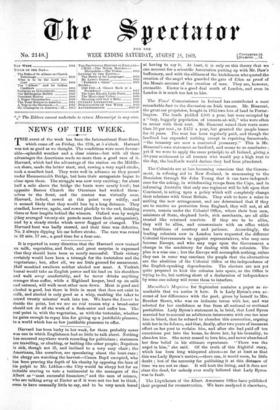The Colonists are at last becoming conscious that the Govern-
ment, in refusing aid to New Zealand, in announcing to the Dominion through Sir John Young that it can have independ- ence for the asking, in withdrawing troops from the Cape, and in informing Australia that only one regiment will be left upon that Continent, is acting upon a policy which will completely change their relations with Great Britain. They wish to have a voice in settling the new arrangement, and are determined that if they are to receive no protection from England, they will not, at all events, remain under the Colonial Office, where their best men, ministers of State, shepherd lords, rich merchants, are all alike treated like returned convicts. If they are to be allies, they will be allies, and communicate with an office which has traditions of courtesy and patience. Accordingly, the leading colonists now in London have requested the different Colonial Governments to appoint representatives, who may soon become Envoys, and who may urge upon the Government a change in the machinery for dealing with the colonists. The plan is a wise one ; but the Envoys will accomplish nothing, unless they can in some way convince the people that the alternatives are the abolition of the Colonial Office or the independence of the English-speaking dependencies. The electors are not yet quite prepared to kick the colonies iuto space, as the Office is trying to do, but nothing short of a declaration of independence by some one colony will rouse them to interfere.






























